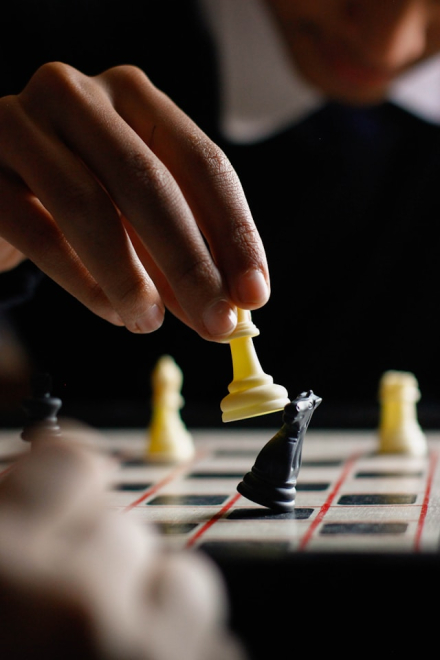- Change theme
Learning from Play: How Casual Competition Can Enhance Strategic Thinking

In a world where creativity, adaptability, and quick decision-making often determine success.
00:13 27 March 2025
In a world where creativity, adaptability, and quick decision-making often determine success, developing strong strategic thinking skills has never been more vital. While formal methods like workshops, training sessions, and academic courses are widely used, there’s an underrated and enjoyable alternative—casual competition. Whether it's through video games, board games, or team sports, informal competitive play offers an engaging, low-pressure environment where strategic thinking can flourish. This article explores how playful competition sharpens decision-making, enhances problem-solving, and fosters transferable skills that can benefit both personal development and professional success.
Improving Mental Adaptability
One of the key pillars of strategic thinking is mental agility, often referred to as cognitive flexibility. Casual competition encourages players to think on their feet, quickly adjust to changing conditions, and see situations from multiple perspectives. Games like soccer or competitive multiplayer video games challenge participants to anticipate others’ actions and pivot strategies in real-time.
Take World of Warcraft, for example—a game that not only requires tactical awareness in real-time combat but also long-term planning for gear, class builds, and group coordination. Players often adjust their roles based on dungeon composition or raid strategies. Investing in WoW gold allows for faster access to resources and gear, letting players focus more on strategic execution rather than endless grinding. This sort of adaptive play mirrors real-life work scenarios, where professionals must respond dynamically to new data or changing goals.
Developing Leadership and Teamwork Capabilities
Strategic competence goes hand in hand with strong leadership and collaboration skills, both of which are naturally cultivated in casual competitive settings. Many games and team sports require effective communication, cooperation, and trust. Participants often switch roles—leading at times, supporting at others—gaining practical insights into leadership dynamics.
In team-based games like Overwatch or co-op titles such as Overcooked, players must manage resources, time, and responsibilities under pressure. World of Warcraft is especially notable for its complex group content like raids and dungeons. Coordinating with a raid group to defeat a high-level boss demands not just mechanical skill, but leadership, role clarity, and synchronized teamwork. Strategic players often use WoW gold to equip themselves with optimal gear beforehand, ensuring their team can perform at its best without last-minute scrambling. This level of prep and coordination translates directly into real-life group projects or business planning.
Unofficial Competition as a Secure Educational Environment
What makes casual competition such an effective teacher is the freedom to fail safely. Unlike high-stakes professional environments, games let you test strategies without lasting consequences. Whether it’s chess, Settlers of Catan, or a ranked PvP match in World of Warcraft, players learn how to evaluate scenarios, manage risks, and recalibrate after setbacks.
Using WoW gold to experiment with new builds, talents, or crafting paths offers a sandbox for creative problem-solving. It encourages players to take calculated risks that improve their understanding of systems without penalizing them with frustrating time sinks. Over time, this builds both analytical ability and confidence—essential traits for making informed decisions under pressure.
Promoting Strategic Thinking in the Long Term
Long-term planning is another area where casual competition excels. Games like Civilization, Monopoly, or WoW’s Auction House system teach players to weigh immediate benefits against future gains. Decisions made early in the game often shape the entire outcome, encouraging players to develop foresight and contingency plans.
In World of Warcraft, managing your gold economy is a strategy in itself. Savvy players invest WoW gold in high-value items, professions, or mounts, often generating profitable returns down the line. This real-time economy simulates many of the challenges found in real-world resource management, from budgeting to investment planning. Learning these mechanics in-game gives players a solid foundation in long-term strategic thought.
Making Decisions Under Pressure and Emotional Resilience
Winning and losing are inevitable parts of any competitive activity, and learning to cope with both outcomes is invaluable. Casual competition provides opportunities to build emotional resilience—a cornerstone of high-pressure decision-making. Whether it’s a tense final move in chess or a last-second goal in a friendly match, these experiences teach composure and emotional control.
World of Warcraft regularly places players in high-stakes scenarios like Mythic+ dungeons or PvP battles. Success often hinges on remaining calm under pressure and making the right calls at critical moments. Being equipped with the best gear—often acquired through WoW gold—removes one layer of stress, allowing players to focus on execution and decision-making. The ability to rebound from defeat, adapt, and try again develops a growth mindset that’s essential in both gaming and life.
Casual competition is more than just entertainment—it’s a powerful learning tool. Whether you’re coordinating a raid in World of Warcraft, negotiating resources in a board game, or working through strategy in a co-op setting, these experiences build critical skills. With the help of accessible tools like WoW gold, players can focus on deep strategy rather than routine tasks, making every match or session more meaningful.
So next time you're playing for fun, remember—you're also leveling up your brain. Whether it’s through games, sports, or virtual challenges, casual competition offers a dynamic and enjoyable path to becoming a sharper, more strategic thinker.
